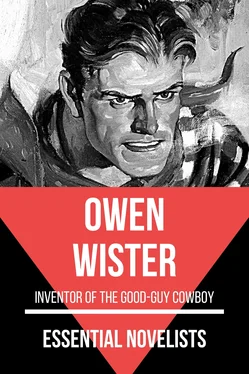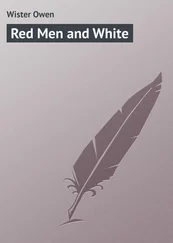“It's two hundred and sixty-three miles,” said the Virginian.
To my loud ejaculation he made no answer, but surveyed me a moment longer, and then said, “Supper will be about ready now.” He took my valise, and I followed his steps toward the eating-house in silence. I was dazed.
As we went, I read my host's letter—a brief hospitable message. He was very sorry not to meet me himself. He had been getting ready to drive over, when the surveyor appeared and detained him. Therefore in his stead he was sending a trustworthy man to town, who would look after me and drive me over. They were looking forward to my visit with much pleasure. This was all.
Yes, I was dazed. How did they count distance in this country? You spoke in a neighborly fashion about driving over to town, and it meant—I did not know yet how many days. And what would be meant by the term “dropping in,” I wondered. And how many miles would be considered really far? I abstained from further questioning the “trustworthy man.” My questions had not fared excessively well. He did not propose making me dance, to be sure: that would scarcely be trustworthy. But neither did he propose to have me familiar with him. Why was this? What had I done to elicit that veiled and skilful sarcasm about oddities coming in on every train? Having been sent to look after me, he would do so, would even carry my valise; but I could not be jocular with him. This handsome, ungrammatical son of the soil had set between us the bar of his cold and perfect civility. No polished person could have done it better. What was the matter? I looked at him, and suddenly it came to me. If he had tried familiarity with me the first two minutes of our acquaintance, I should have resented it; by what right, then, had I tried it with him? It smacked of patronizing: on this occasion he had come off the better gentleman of the two. Here in flesh and blood was a truth which I had long believed in words, but never met before. The creature we call a GENTLEMAN lies deep in the hearts of thousands that are born without chance to master the outward graces of the type.
Between the station and the eating-house I did a deal of straight thinking. But my thoughts were destined presently to be drowned in amazement at the rare personage into whose society fate had thrown me.
Town, as they called it, pleased me the less, the longer I saw it. But until our language stretches itself and takes in a new word of closer fit, town will have to do for the name of such a place as was Medicine Bow. I have seen and slept in many like it since. Scattered wide, they littered the frontier from the Columbia to the Rio Grande, from the Missouri to the Sierras. They lay stark, dotted over a planet of treeless dust, like soiled packs of cards. Each was similar to the next, as one old five-spot of clubs resembles another. Houses, empty bottles, and garbage, they were forever of the same shapeless pattern. More forlorn they were than stale bones. They seemed to have been strewn there by the wind and to be waiting till the wind should come again and blow them away. Yet serene above their foulness swam a pure and quiet light, such as the East never sees; they might be bathing in the air of creation's first morning. Beneath sun and stars their days and nights were immaculate and wonderful.
Medicine Bow was my first, and I took its dimensions, twenty-nine buildings in all,—one coal shute, one water tank, the station, one store, two eating-houses, one billiard hall, two tool-houses, one feed stable, and twelve others that for one reason and another I shall not name. Yet this wretched husk of squalor spent thought upon appearances; many houses in it wore a false front to seem as if they were two stories high. There they stood, rearing their pitiful masquerade amid a fringe of old tin cans, while at their very doors began a world of crystal light, a land without end, a space across which Noah and Adam might come straight from Genesis. Into that space went wandering a road, over a hill and down out of sight, and up again smaller in the distance, and down once more, and up once more, straining the eyes, and so away.
Then I heard a fellow greet my Virginian. He came rollicking out of a door, and made a pass with his hand at the Virginian's hat. The Southerner dodged it, and I saw once more the tiger undulation of body, and knew my escort was he of the rope and the corral.
“How are yu' Steve?” he said to the rollicking man. And in his tone I heard instantly old friendship speaking. With Steve he would take and give familiarity.
Steve looked at me, and looked away—and that was all. But it was enough. In no company had I ever felt so much an outsider. Yet I liked the company, and wished that it would like me.
“Just come to town?” inquired Steve of the Virginian.
“Been here since noon. Been waiting for the train.”
“Going out to-night?”
“I reckon I'll pull out to-morro'.”
“Beds are all took,” said Steve. This was for my benefit.
“Dear me,” said I.
“But I guess one of them drummers will let yu' double up with him.” Steve was enjoying himself, I think. He had his saddle and blankets, and beds were nothing to him.
“Drummers, are they?” asked the Virginian.
“Two Jews handling cigars, one American with consumption killer, and a Dutchman with jew'lry.”
The Virginian set down my valise, and seemed to meditate. “I did want a bed to-night,” he murmured gently.
“Well,” Steve suggested, “the American looks like he washed the oftenest.”
“That's of no consequence to me,” observed the Southerner.
“Guess it'll be when yu' see 'em.”
“Oh, I'm meaning something different. I wanted a bed to myself.”
“Then you'll have to build one.”
“Bet yu' I have the Dutchman's.”
“Take a man that won't scare. Bet yu' drinks yu' can't have the American's.”
“Go yu'” said the Virginian. “I'll have his bed without any fuss. Drinks for the crowd.”
“I suppose you have me beat,” said Steve, grinning at him affectionately. “You're such a son-of-a—— when you get down to work. Well, so long! I got to fix my horse's hoofs.”
I had expected that the man would be struck down. He had used to the Virginian a term of heaviest insult, I thought. I had marvelled to hear it come so unheralded from Steve's friendly lips. And now I marvelled still more. Evidently he had meant no harm by it, and evidently no offence had been taken. Used thus, this language was plainly complimentary. I had stepped into a world new to me indeed, and novelties were occurring with scarce any time to get breath between them. As to where I should sleep, I had forgotten that problem altogether in my curiosity. What was the Virginian going to do now? I began to know that the quiet of this man was volcanic.
“Will you wash first, sir?”
We were at the door of the eating-house, and he set my valise inside. In my tenderfoot innocence I was looking indoors for the washing arrangements.
“It's out hyeh, seh,” he informed me gravely, but with strong Southern accent. Internal mirth seemed often to heighten the local flavor of his speech. There were other times when it had scarce any special accent or fault in grammar.
A trough was to my right, slippery with soapy water; and hanging from a roller above one end of it was a rag of discouraging appearance. The Virginian caught it, and it performed one whirling revolution on its roller. Not a dry or clean inch could be found on it. He took off his hat, and put his head in the door.
“Your towel, ma'am,” said he, “has been too popular.”
She came out, a pretty woman. Her eyes rested upon him for a moment, then upon me with disfavor; then they returned to his black hair.
“The allowance is one a day,” said she, very quietly. “But when folks are particular—” She completed her sentence by removing the old towel and giving a clean one to us.
Читать дальше










